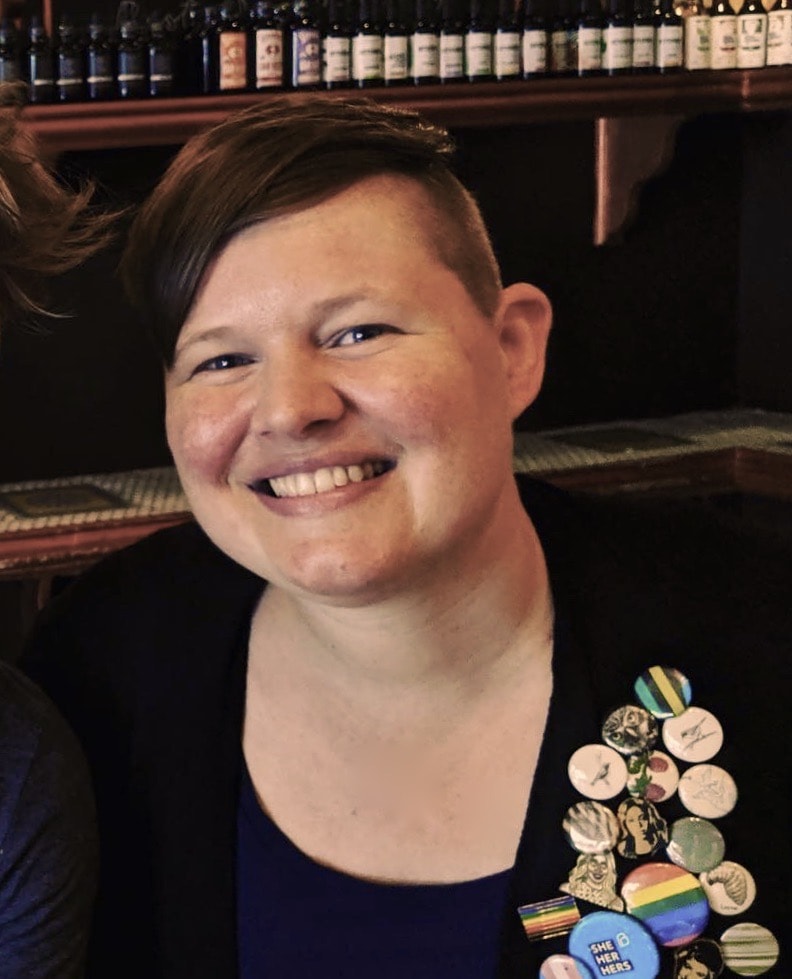I am an associate professor of education at VTSU-Johnson, where I am the co-director of the Elementary + Special Education program. Before returning to the United States to pursue an academic career in 2009, I lived in China for seven years where I taught elementary and secondary science, and also English as a foreign language.
My scholarship interrogates the process of social change through a critical lens in educational systems, with a focus on privilege, power, justice, and oppression. My academic career began in the field of science and environmental education, and in my early career I focused on climate change curriculum development, climate change education, and education for sustainability. My current research project, “TeachOut Vermont,” uses critical participatory action research to build sustainable, equitable, and transformative social networks with and for queer, nonbinary, and transgender teachers in Vermont. This research is supported in part by the Spencer Foundation, the Vermont State University President’s Fund, and the Working Learning Communities grant.
I live in Morrisville with my wife and too many pets. When I am not working, I spend my time knitting, playing games, and birding. I am also on a quest to read, write, and knit in all of Vermont’s 187 public libraries. Wish me luck!
Ph.D., Curriculum, Instruction, and Teacher Education. Michigan State University.
Ed.S., Curriculum and Instruction, Science Education. University of Florida.
M.A., Environmental Education. Goshen College.
B.A., Biology. Rhodes College.
- EDU 2005 Reading, Writing, and Math for Educators
- EDU 2360 Perspectives on Learning in a Diverse Society
- EDU 3125 Educational Technology
- EDU 3265 Instructional Dynamics I
- EDU 4630 Integrated Elementary Methods
- EDU 4650 Capstone Seminar
- EDU 6850 Elementary Student Teaching
- EDU 5011 Seminar in Educational Studies
- EDU 5021 Instructional Dynamics I for Elementary Education
- EDU 6011 Integrated Elementary Methods
- EDU 6555 Critical and Cultural Perspectives in Education
- EDU 6970 Capstone Seminar
- Miller, H. K., O’Neill, A., & Ely, G. (In preparation). Joy takes time: building community with and for LGBTQ+ educators.
- Miller, H. K., Ely, G., & O’Neill, A. (In preparation). Embracing the messiness of critical participatory action research with LGBTQ+ educators.
- Miller, H. K., Freed, A. F., Johnson, W. R., Doherty, J. H., & Anderson, C. W. (2024). The role ofcross-cutting concepts in developing a three-dimensional learning progression framework. In H. Jin, Yan D., & J. Krajcik, (Eds.), Handbook on science learning progressions. Routledge.
- Freed, A., Huffling, L. A., Benavides, A., & Miller, H. K. (2024). Moving from doctoral student to teacher educator faculty in critical collaboration: Carving out an expansive learning space for innovation in research and practice. In B. M. Butler & J. K. Ritter (Eds.), Professional learning journeys of teacher educators. Information Age Publishing.
- Miller, H. K. (2019). Quietism in the face of injustice: A cultural Mennonite’s struggle (and failure) in the fight for justice in science and environmental education. In J. Bazzul & C. Burke (Eds.), Critical voices in science education: Narratives of academic journeys (pp. 13-24). Springer. https://www.springer.com/gp/book/9783319999890
- Miller, H. K. (2018). Developing a critical consciousness of race in place-based environmental education: Franco’s story. Environmental Education Research, 24(6), 845-858. https://doi.org/10.1080/13504622.2017.1357802
- Miller, H. K. (2018). “Being a good person in the system we already have will not save us”: interpreting how students narrate and embody the process of social change for sustainability using an agency/structure lens. Environmental Education Research, 24(1), 145. https://doi.org/10.1080/13504622.2017.1303821
- Miller, H. K., Johnson, W., & Anderson, C. W. (2017). Using Crosscutting Concepts as a Tool for Climate Change and Citizenship Education. In D. P. Shepardson, A. Roychoudhury, & A. Hirsch (Eds.), Teaching and Learning about Climate Change: A Framework for Educators. Routledge. https://www.taylorfrancis.com/chapters/edit/10.4324/9781315629841-13/using-next-generation-science-standards-crosscutting-concepts-tool-climate-change-citizenship-education-1-hannah-miller-charles-anderson
- Miller, H. K. (2016). Undergraduates in a sustainability semester: models of social change for sustainability. Journal of Environmental Education, 47(1), 52-67. https://doi.org/10.1080/00958964.2015.1072703
- Miller, H. K., & Jones, L. C. (2014). Analyzing sustainability themes in state science standards:
- two case studies. Applied Environmental Education and Communication, 24(2), 183-192. https://doi.org/10.1080/1533015X.2014.961888
- Dauer, J., Miller, H. K., & Anderson, C. W. (2014). Conservation of energy: An analytical tool for student accounts of carbon-transforming processes. In R. Chen, A. Eisenkraft, D. Fortus, J. Krajcik, K. Neumann & A. Scheff (Eds.), Teaching and Learning of Energy in K-12 Education (pp. 47-61). Springer. https://link.springer.com/chapter/10.1007/978-3-319-05017-1_4





